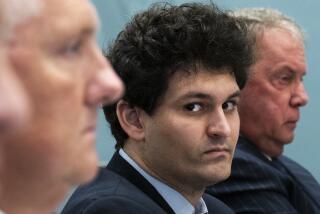DERIVATIVES STRIKE AGAIN : Collapse of Barings Has Mild Effect on Markets : Securities: But firm’s loss of at least $800 million sparks further controversy over tightening derivatives controls.
- Share via
Financial markets in the United States and Europe largely shrugged off Sunday’s collapse of Barings, Britain’s oldest investment bank, as police in Malaysia continued searching for the 28-year-old Briton whose huge, unauthorized derivatives trades are blamed for scuttling the firm.
Although the financial damage appeared unlikely to spread much beyond Barings itself, the failure prompted calls by U.S. and British officials for tighter regulation of trading in derivatives, complex securities whose values are tied to stocks, bonds, commodities or market indexes.
Barings trader Nicholas Leeson’s dealings in stock market futures contracts on the Singapore and Osaka exchanges amounted to a massive bet against the Nikkei index falling--a bet that went horribly wrong, as the index slipped nearly 15% in the last two months.
With the firm’s losses still not quantified but estimated at at least $800 million, the Nikkei 225-stock index dropped 4% Monday to a 15-month low. However, the market recovered in early trading today.
By all accounts, Leeson is no glamour boy, but a bulky, balding figure whose family lives in public housing in the north London suburb of Watford, a byword in Britain for drabness.
Colleagues call him confident, even cocky. His family defends him as a humble Londoner who made good in the helter-skelter world of Singapore money markets.
“Before this thing happened, we thought he was very brilliant, the most confident trader around town,” a rival dealer said in Singapore. “He seems to be able to move markets. Every day, we would monitor what he’s doing.”
Derivatives have come under scrutiny lately because of a string of financial upheavals. Orange County declared bankruptcy in December after derivatives trading by former Treasurer Robert L. Citron led to losses of $1.7 billion. Several corporations, notably Procter & Gamble, also reported large derivatives losses last year.
Some experts cautioned Monday against restrictions that would hobble such trading, arguing that derivatives, properly used, are an important tool in managing risk.
*
“Look, it’s Col. Mustard with a candlestick in the solarium. Are you going to blame the candlestick for that one?” said Robert Brusca, chief economist for Nikko Securities International in New York.
U.S. and German bond markets rallied Monday as investors fled to the safety of government-backed securities. The yield on the 30-year U.S. Treasury bond fell to a six-month low.
In London, shares reversed big opening losses to end only a bit lower. The Dow Jones industrial average shed 23.17 points to close at 3,988.57, but observers said there was no apparent link to the Barings debacle.
“We believe no financial institution in the United States, at least so far, has significant exposure to Barings,” a senior Clinton Administration official said Monday.
“In many ways it’s almost a source of comfort that there can be a failure of a well-known institution without causing serious havoc,” said Jon Macaskill, a New York-based derivatives market analyst.
Still, there was profound consternation in England that a “rogue trader” could single-handedly sink an institution founded in 1762 and with long ties to British royalty.
The failure prompted Chancellor of the Exchequer Kenneth Clarke to announce a sweeping review of the British banking system and call for a deeper review of international derivatives practices.
Bank of England Gov. Eddie George said Leeson’s job was to exploit tiny price differences between stock exchanges in Tokyo, Osaka and Singapore. Such dealing, known as arbitrage, is safe and profitable for the nimble trader as long as he matches buy and sell orders.
*
But a few weeks ago, Leeson started to flout this rule by building up big speculative positions, George told reporters. By the time Barings managers realized something was wrong late last week, Leeson had bought Japanese stock index futures--paper promises to buy a basket of shares--worth $7 billion, in a wild bet that prices would rise and net him a fortune.
George acknowledged that there might be a case for closer regulation of derivatives, but cautioned that it is too early to draw a conclusion.
Nicholas Horsley, co-manager of Warburg, Pincus International Equity Fund in New York, said of the collapse, “The impact in a monetary sense will be minimal, but improved regulation of derivatives will be Barings’ legacy.”
Whereas the technical people who design derivatives “literally could be rocket scientists,” Horsley said, many senior managers of investment firms are “techno-phobic.”
*
Times staff writers Tom Petruno and James F. Peltz and wire services contributed to this report.
More to Read
Inside the business of entertainment
The Wide Shot brings you news, analysis and insights on everything from streaming wars to production — and what it all means for the future.
You may occasionally receive promotional content from the Los Angeles Times.










